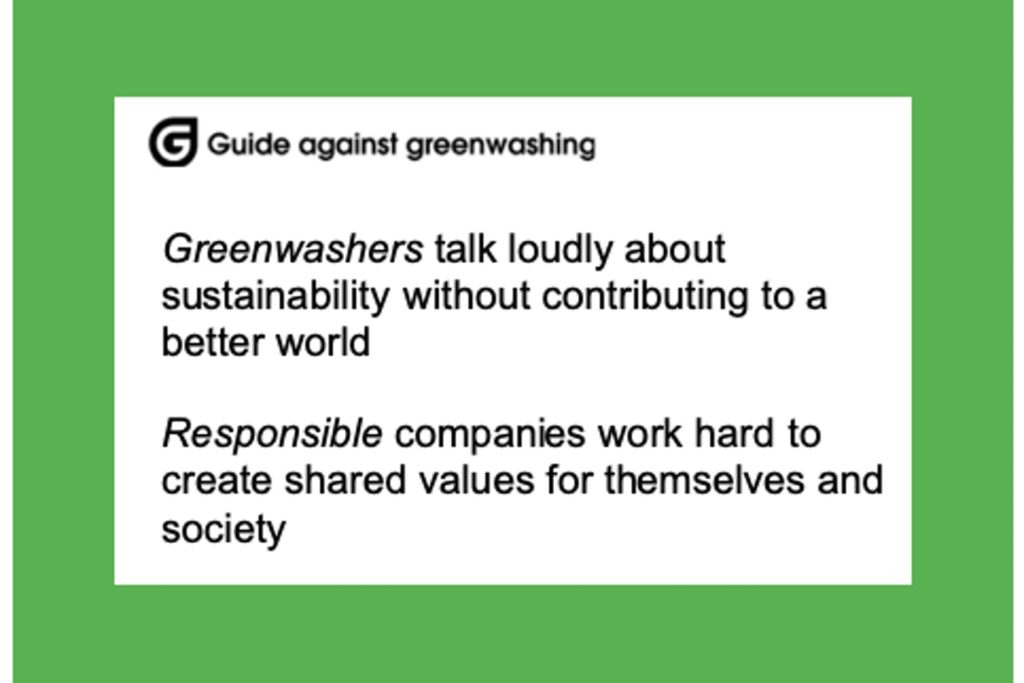Be wary of companies whose sustainability claims come out of their marketing departments or are bought from clever PR consultants, say the people behind the Guide Against Greenwashing.

– Responsible businesses worldwide need to collaborate to fight greenwashing, says Bjørn Kjærand Haugland (center picture), the CEO of a Norwegian business network Skift – Business Climate Leaders. The organization has launched a guide with ten principles for businesses to avoid the common pitfalls of greenwashing, which can be found at stopgreenwashing.no.
Businesses worldwide need a guide against Greenwashing.
Skift – Business Climate Leaders, together with Norwegian environmental organizations and activists, have developed 10 principles to help us tell the difference between greenwashing and responsible marketing. Mathias Juell Johnsen is the head of communication and politics in Skift – Business Climate Leaders, and has been running the initiative Guide Against Greenwashing in Norway since the launch in June. This talk was given at a TEDx event using the TED conference format but independently organized by a local community.

There’s a risk that sustainability will lose its meaning.
Greenwashing is harmful first and foremost because it misleads consumers, and creates apathy and mistrust in individuals we are completely dependent on engaging in efforts for the environment and climate.That is also why this initiative is important. It allows companies to send a clear signal both internally and externally that this is something to avoid for all it is worth, while incorporating good routines to give sustainability communication real content.
Bjørn Kjærand Haugland, CEO, Skift
The global launch is supported by more than 200 companies and global organizations such as the Green Recovery Alliance in Europe, Sustainable Business Network (CER) in Slovenia, Business Council for Sustainable Development (BCSD) in Portugal, and Center for Responsible Leadership (CRL) in New York. The campaign was originally launched in Norway after Skift was challenged by activists to take action on the issue, with the support of the Norwegian branch of WWF, and the organizations ZERO and Future in our hands.
The need for a Guide Against Greenwashing
We see that lots of companies end up greenwashing, without necessarily intending to do so. They just lack the knowledge to fully assess the impacts of their products and services. This guide aims to help companies avoid this, says Haugland.
The guide takes on everything from word use and phrasing to marketing budgets and climate quotas. It defines the activity of greenwashing as a form of misleading marketing or communication, where a product, service or company is presented as “better” in respect to climate change, the environment or human rights issues, without proper documentation to back this claim.
The former CEO of Unilever and co-founder of the organization Imagine, Paul Polman, supports the campaign.
– As more and more businesses make commitments to pivot to more sustainable and equitable business models that work for all stakeholders it is key to hold ourselves accountable and work transparently to close the often perceived too big “Say-do” gap. Business has a unique opportunity here to build trust and ultimately prosperity for all. A crucial leadership moment, says Polman.
The Guide is also welcomed by Pascal Canfin, President of European Parliament Environment Committee, who earlier this year gathered 180 political decision-makers, business leaders, trade unions, NGOs, and think tanks to form a European alliance for a Green Recovery.
The transition towards climate neutrality by 2050 is the challenge of our generation. We will overcome it through the successful implementation of the European Green Deal and the investment in a sustainable recovery to avoid further crisis. I welcome this guide as it shows that business is ready to deliver and act differently – now. It’s crucial for companies to put sustainability at the core of their business models and promote good and transparent practices about their transition journey, he says.
All businesses are welcome to sign the guide, to send a signal to both their customers, employees and business-partners. Haugland at Skift underlines that the guide is a campaign to raise awareness and help businesses, and that it is the governing bodies of the respective countries around the world that have to enforce the laws on marketing. He encourages making this form of marketing illegal, as a lot of countries, including Norway, already have.
– However, there are a lot of grey areas, and limited budgets for these public institutions, so businesses have to do their part, he concludes.
The Norwegian Climate Paradox
Haugland said that oil and gas firms stand out as the most prone to greenwashing, as they have faced the most pressure to move away from climate change-linked fossil fuels.
In their marketing, oil and gas companies have avoided talking about oil and focused on the “green elements” of their portfolios, spuriously communicating natural gas as a clean “bridge” to renewables, he noted.
Norway, Haugland admitted, has struggled with the dilemma of being a highly sustainability-conscious country and also a major exporter of oil and gas.
However, Haugland said it was unhelpful to single out the oil and gas industry. “We all burn oil and gas as consumers. So it’s a little bit unfair to point the finger.”
“Our core message is that nobody is perfect. We don’t only want the best companies to sign up [to the greenwashing campaign]. We want companies to sign up to acknowledge that this is important, and get better at how they communicate,” he said.
Equinor is the 37 largest contributor to CO2 emmisons in the World.
The Guardian: Just 100 companies have been the source of more than 70% of the world’s greenhouse gas emissions since 1988, according to a new report.
The Carbon Majors Report (pdf) “pinpoints how a relatively small set of fossil fuel producers may hold the key to systemic change on carbon emissions,” says Pedro Faria, technical director at environmental non-profit CDP, which published the report in collaboration with the Climate Accountability Institute.

The guide’s 10 principles for avoiding greenwashing are:
1. Be honest and accountable.
Be careful of using words like green, sustainable, recyclable, eco- and fair, without both explaining and documenting what your company has done or will do to make sure this statement can be verified. Avoid using pictures of pristine nature, green leaves, windmills or happy workers to come off as more sustainable. When marketing your product or service, do not use results from reports without context.
2. Make sure that your company’s sustainability efforts are not limited to your communications and marketing departments.
Companies that continue with business as usual, but employ a marketing strategy focusing on sustainability will end up as greenwashers. Aim for a holistic approach on sustainability.
3. Avoid talking about the importance of sustainability, nature, the climate and ethical trade, if your company has not made serious efforts on these issues.
It is nice to raise the pride flag, mark International Women’s day, wear a United Nations Sustainable Development Goals pin or share #blacklivesmatter, but it will appear hollow if this is the extent of your commitment to sustainability.
4. Do not downplay your company’s own emissions and negative impacts on the climate, nature and human lives.
It is better to admit being a part of the problem and focus on what could be done to become better. A good plan and clear goals will be appreciated by the public. Most people cheer for those who do their best.
5. Don’t use a big share of the marketing budget on small measures that do not affect your company’s footprint significantly.
If marketing is focused on the five per cent of your product range labeled as “sustainable”, but the remaining 95 per cent is causing harm to the climate, environment and people producing them, you should have concrete plans of changing that ratio drastically.
6. Avoid buying a clean conscience through carbon offsets or by letting others clean up ocean plastic.
Businesses that take sustainability efforts seriously start by working on their own footprint.
7. Use established labelling, or work towards the establishment of good labelling mechanisms in your industry if it is lacking today.
The use of labels of established certification frameworks make it easier for both people and businesses to make informed choices. The use of labels to mislead is not advised.

8. Be careful using terms such as “better for the climate, nature, and the environment”.
Almost all production of goods and services affects the biosphere negatively. If there is no concrete documentation of how a product could be deemed “better”, it should not be marketed as such.
9. “Cherry-picking” from the United Nations Sustainable Development Goals can lead you astray.
The most important sustainability goals are those that have the closest link to the company’s core activities. If the production line emits big amounts of carbon-dioxide, or violates human rights in another country, you should avoid marketing the work done on equality in your home country.
10. Donations and sponsorships are great, but not proof that you are working on sustainability issues.
Focus on the company’s core activities, rather than listing donations to a respected organisation as the company’s effort towards change. Align your products and services to the UN Sustainable Development Goals and the Paris Agreement.




42 Comments
Pingback: The EU Taxonomy for Sustainable Activities - Bergensia
Pingback: Kingmaker Casino ค่ายเกมคาสิโนสุดแปลก ไม่เหมือนใคร
Pingback: qiuqiu99 link
Pingback: จํานําโฉนดที่ดิน ไม่ใช่ชื่อเรา
Pingback: เรียนภาษาญี่ปุ่น
Pingback: jazz coffee
Pingback: Ks Quik 2000
Pingback: casino online
Pingback: buy dmt vape pens
Pingback: nagaway สล็อต
Pingback: Hotel in Latvia
Pingback: แผ่น HPMC
Pingback: รับพิมพ์สติ๊กเกอร์
Pingback: เว็บปั้มไลค์
Pingback: fifa55cash
Pingback: ตู้เชื่อม
Pingback: จอ led ขนาดใหญ่
Pingback: บับเบิ้ลกันกระแทก
Pingback: Apartheid
Pingback: Jaxx Liberty
Pingback: แทงบอลสเต็ป
Pingback: เว็บปั้มไลค์
Pingback: Bonuses
Pingback: สล็อตเว็บตรง ปั่นเวลาไหนได้เงินปังที่สุด อัพเดทใหม่
Pingback: PGSLOT โบนัสแตกสนั่น ปั่นเกมไหนโบนัสก็แตก ฝากถอนออโต้
Pingback: betflix wallet
Pingback: kc9
Pingback: Plinko
Pingback: พิมพ์ใบปลิว
Pingback: undressing girl
Pingback: King Chance
Pingback: รีวิวเกมสล็อต ค่าย PG SLOT
Pingback: ไพ่ 3 ทาง
Pingback: ไฟหน้ารถยนต์โปรเจคเตอร์
Pingback: betcenter
Pingback: pg168
Pingback: hor kiepraam naar buiten
Pingback: ดูหนังใหม่
Pingback: Logo
Pingback: 7slots
Pingback: Can you trust climate information? How and why powerful players are misleading the public - Bergensia
Pingback: รับงานเอง